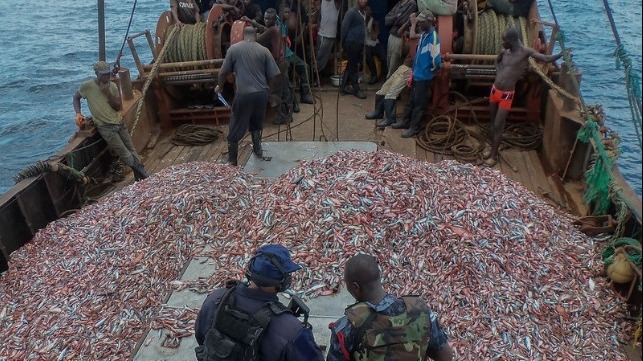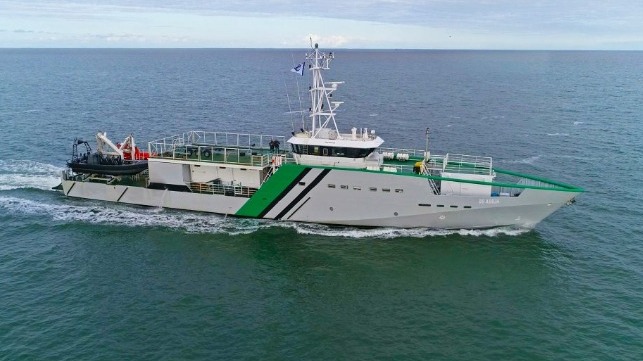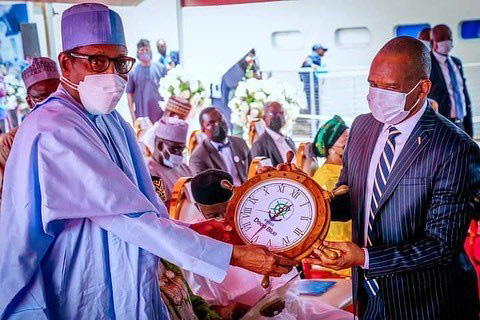Study: In Nigeria, Illegal Fishing is Linked With Crime and Piracy

Like most countries in West Africa, Nigeria’s coastal waters contain diverse species of fish, which contribute to the food and economic security of its people.
Small-scale fishing operations contribute 80 percent of locally produced fish and support the livelihoods of 24 million Nigerians. 73 percent of those involved in fisheries in Nigeria are women.
The overall GDP contribution from fishing – small scale and industrial – was 0.84 percent in 2019 and 1.09 percent in 2020. The fisheries sector is therefore a route to socioeconomic development in Nigeria. But it also faces threats.
One of these is environmental pollution, primarily from the oil industry. Pollution degrades the maritime environment, destroys fish stocks and reduces the catch.
Another threat is illegal fishing, as our previous research has found. The first step is to understand the scale and complexity of illegal fishing and associated crime, and why it is happening.
Scale and costs
Recently, the Nigerian House of Representatives noted that the country loses $70 million each year to illegal fishing. This includes loss of licence fees, revenue from taxation and the value that could have been accrued from legitimate fishing by local vessels.
Other sources estimate the cost of illegal fishing in Nigeria as much higher, citing anywhere between $600 million and $800 million each year.
The variation in these figures reveals the difficulties in calculating the costs of clandestine activity. It’s also a result of budgetary neglect of the Nigerian Federal Fisheries Department. The department lacks the capacity to monitor, survey and control vessels operating in Nigeria.
Vessels from China, the European Union, and Belize are notable for illegally exploiting Nigerian waters.
Despite varying estimates, all sources agree that the economic losses caused by illegal fishing in Nigeria are high. But the figures alone paint a superficial picture of the true costs of illegal fishing. Illegal fishing does not occur in isolation.
Fisheries crime
Fisheries crime denotes a vast and diverse category of illegality and criminality that aids or accompanies illegal fishing. Such crimes can include corruption, customs fraud, human and drugs trafficking and piracy. Illegal fishing and fisheries crime also threaten human rights.
Our previous research found that illegal fishing was undermining people’s livelihoods. The lack of government support to address illegal fishing and protect livelihoods within fishing communities further pushes people into poverty. This makes them vulnerable to criminal networks.
Fisherfolks may end up participating in, and being victimized by, fisheries crime as a result. This is evidenced in increasing criminality through rising incidents of piracy and armed robbery at sea throughout Nigeria’s coastal communities.
Maritime insecurity also has a gender dimension. Women in West African fisheries face unique challenges and risks such as poor access to capital, growing competition for access to depleting fish stocks, and policy exclusion.
Neglect and poor regulations
Despite the important contribution that fishing makes to the livelihoods of Nigerians, government neglects this sector. This is evident in the marginal budgetary allocation the sector receives yearly.
The Monitoring, Control and Surveillance Department of Nigeria’s Federal Fisheries Department is critical to managing Nigeria’s fisheries. Yet no budgetary allocation has been made to it in the last 15 years.
The Monitoring, Control and Surveillance Department lacks patrol vessels, and is therefore unable to monitor the activities of vessels operating in Nigeria. In 2017, the government announced plans to purchase patrol vessels, but it hasn’t done so yet.
The sector doesn’t receive enough funding to function effectively. Nigeria’s Fisheries Department operates within the country’s Federal Ministry of Agriculture and Rural Development, which was allocated less than two percent of the national budget in 2019.
Existing fisheries regulation is also inadequate. Nigeria’s fisheries are governed by the Sea Fisheries Act of 1992. These regulations are outdated and ill-equipped to address the current scale and severity of growing fisheries crime.
For example, in June 2020, a vessel, Hai Lu Feng 11, was fined ?3 million (under $7,300) for switching off its Vessel Monitoring System while in Nigeria’s Exclusive Economic Zone.
The Vessel Monitoring System is designed to provide estimates of fishing activity in near real time. Switching the system off suggests an intent to evade detection by the authorities. But this fine is tiny when considering the millions of dollars that illegal fishing costs the Nigerian economy each year.
Solutions to illegal fishing
Solving the problem of illegal fishing in Nigeria requires that the Federal Department of Fisheries is supported to operate effectively. As the agency charged to ensure the sustainable exploitation of Nigeria’s fisheries, it must be adequately funded.
Current fisheries regulations must also be updated to reflect the current realities and impacts of fisheries crime.
A holistic and collaborative approach is critical to addressing fisheries crime. A national maritime security strategy is needed to guide and facilitate inter-agency and regional cooperation. The strategy should include the establishment of an information-sharing platform.
The capture of the pirates that targeted Hai Lu Feng 11 vessel by the Nigeria navy was supported by the Fisheries Committee for the West Central Gulf of Guinea. This was through the regional online communications platform established under the West Africa Task Force.
This shows that cooperation between fisheries agencies and other maritime enforcement agencies is critical to stemming the tide of illegal fishing – and other crime at sea.
Ifesinachi Okafor-Yarwood is a Lecturer at University of St Andrews.
Sayra van den Berg Bhagwandas is a postdoctoral researcher at University of St Andrews.
This article appears courtesy of The Conversation and may be found in its original form here.
Nigeria Launches Deep Blue Campaign to Stop Regional Piracy

Nigeria marked the official launch of its highly anticipated Integrated National Security and Waterways Protection Infrastructure, also known as the Deep Blue Project. The country’s leaders gathered to show off some of the $195 million of equipment that will be used in a coordinated effort with its primary objective of securing Nigerian waters along the Gulf of Guinea and the country’s oil infrastructure with a coordinated combination of land, sea, and air forces.
Leading up to the launch ceremonies, Nigeria’s Maritime Security Unit (MSU) of the Deep Blue Project, comprising personnel from the Nigerian Navy, Nigerian Army, Nigerian Air Force, Nigeria Police, and Department of State Services, conducted simulation exercises. Their goal was to demonstrate their preparedness for full deployment to fight the ongoing menace of piracy, mostly emerging from the Nigeria's Niger Delta region.
According to Director General of the Nigerian Maritime Administration and Safety Agency (NIMASA), Dr. Bashir Jamoh, “With the deployment of the assets of the Deep Blue Project, we are entering another level of national security designed for total spectrum maritime security and better domain awareness using some of the latest technology. This effort to secure our waters will give Nigerians more leverage to harness the enormous resources of our maritime environment and aid the drive towards economic diversification.”

Nigerian President Muhammadu Buhari lead the dedication ceremonies (NIMASA)
Security services have repeatedly warned recently of the increasing threats and dangers in the region from piracy. The Gulf of Guinea has seen the highest number of kidnappings and assaults on ships along with oil theft on land, robbery, and human and drug trafficking.
The Deep Blue Project is the first integrated maritime security strategy in West and Central Africa aimed at the ongoing threats of piracy and robbery. Among the assets that Nigeria will be deploying are 16 armored vehicles for coastal patrol, two special mission vessels, 17 fast interceptor boats, two special mission aircraft for surveillance of the country’s exclusive economic zone (EEZ), three special mission helicopters for search and rescue operations, and four unmanned aerial vehicles. The Maritime Security Unit is made up of 600 specially trained troops.
Coordinating the efforts, the Nigerians have set up a central command and control center based in Lagos, which will also liaise with other regional security efforts. Nigeria also admits that prosecution of suspected criminals was a challenge in the past, but says that the Suppression of Piracy and Other Maritime Offenses (SPOMO) Act passed by its National Assembly will now provide legal backing for prosecution and punishment of offenders.
In addition to questions if Nigeria has the political will to truly confront piracy, security analysts have highlighted that the pirates are becoming more brazen and violent in their attacks. In January 2021, four armed assailants staged an attack on a box ship which was called the attack was well-coordinated and sophisticated that resulted in the death of one member of the crew and the abduction of 15 others. Recently, concerns have been raised that the pirates have been going after more targets including regional fishing vessels and operating further offshore, sometimes more than 200 nautical miles away from their camps in the Nigerian Delta.
While it is several years since plans for this initiative were first announced, the shipping industry welcomed the official launch of the program. In a joint statement from the leaders of shipping industry associations, the International Chamber of Shipping, INTERTANKO, INTERCARGO, and BIMCO as well as the Oil Companies International Marine Forum, they congratulated Nigeria expressing their hope that it “will seriously impact on the ability of pirate groups to prey on merchant shipping.”
In May, responding to growing concerns and increasing attacks in the region, a task force of stakeholders from across the shipping industry released the Gulf of Guinea declaration on the Suppression of Piracy. Since the release of the declaration three weeks ago, over 320 organizations across the maritime industry including flag state administrations, ship owners, charterers, and shipping associations, all signed on committing themselves to tangibly supporting anti-piracy law enforcement efforts, all aimed at finally bringing an end to the dangers of shipping in the Gulf of Guinea.
No comments:
Post a Comment